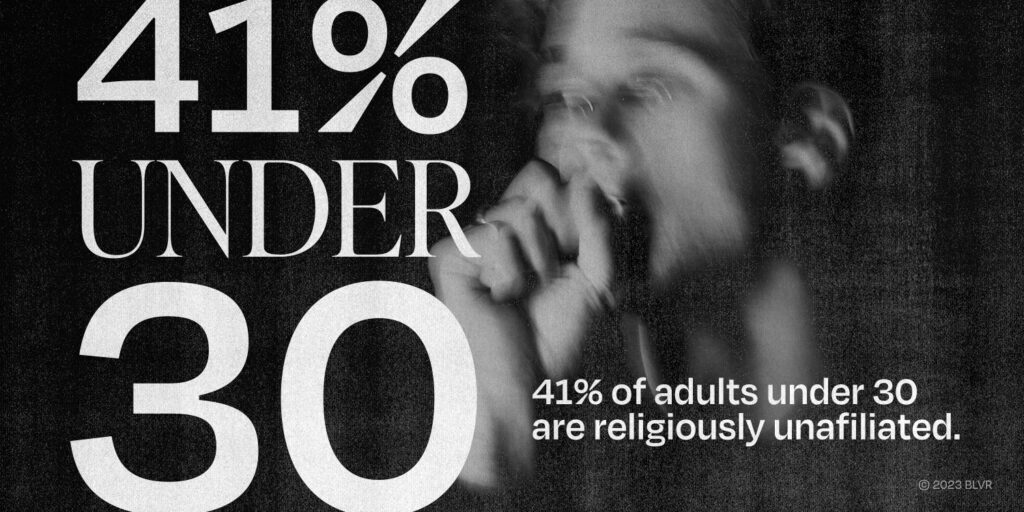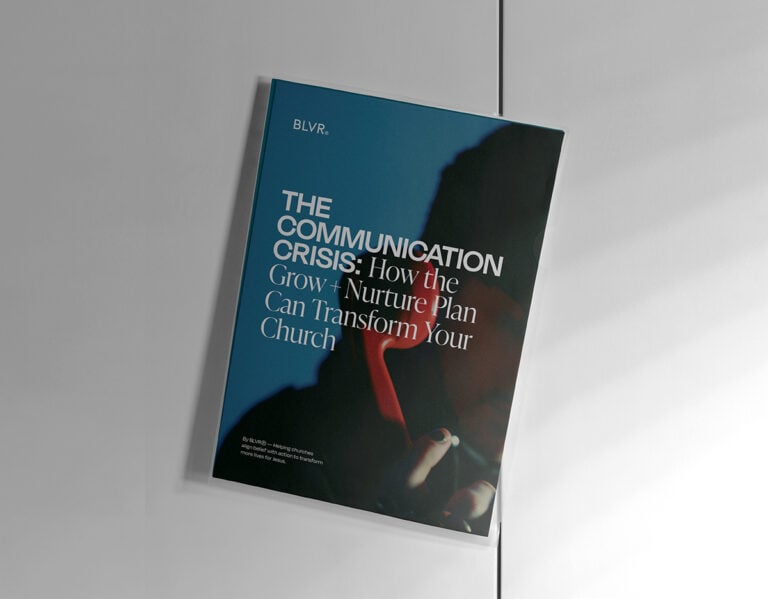
Church Branding / BY Scott Hancock
The Rise of the
‘Nones’: Adapting Church Branding to Connect with a Changing Audience
Published On 01.10.2024
NAVIGATING A SHIFTING LANDSCAPE
In today’s rapidly evolving spiritual landscape, churches face a unique challenge: connecting with the growing demographic of ‘Nones’ – those who identify as religiously unaffiliated. This demographic shift poses a critical question for church leaders: how can church branding evolve to remain relevant and engaging in a society where traditional modes of religious engagement are increasingly bypassed?
UNDERSTANDING THE ‘NONES’
Statistical Insight: Pew Research Center (2023) reports a significant rise in the percentage of U.S. adults identifying as ‘Nones’, now accounting for 29% of the population. This group has emerged as the second-largest religious group in the country, only surpassed by Christians.
The Challenge: This trend reflects a deeper, more complex shift in societal attitudes towards organized religion. Churches are now tasked with bridging the gap between their traditional practices and the diverse, evolving needs of modern congregants, especially younger generations.
ADAPTING CHURCH BRANDING FOR MODERN TIMES
Reevaluating Visual Identity: Churches with outdated visual identities risk losing up to 50% engagement from younger audiences (The Church Branding Institute, 2023). An antiquated logo or website design can disconnect churches from visually-oriented, digitally-native younger demographics.
Aligning with Contemporary Values: The rebranding process begins with aligning the church’s core values with those of modern society. This is not about changing the church’s beliefs, but rather presenting them in a way that resonates with today’s audience.
Revitalizing Communication: Inconsistencies in messaging can lead to confusion about a church’s values and mission. A coherent, contemporary brand voice is essential in appealing to and engaging with the ‘Nones’.

ENGAGING THE DIGITAL GENERATION
Digital Strategy: The digital revolution has fundamentally changed how people connect and seek community. Post-COVID-19, a robust digital presence has become indispensable for churches looking to engage with younger audiences effectively. People will often check out a church’s sermons online 3-5 times before ever stepping foot inside the church to attend a service. So, the video sermons need to be engaging and well produced.
Content That Resonates: Utilizing varied content forms like blog posts, social media campaigns, and interactive online platforms can significantly enhance a church’s appeal to the ‘Nones’.
THE PATH FORWARD: STRATEGIC REBRANDING
Comprehensive Rebranding Approach: Beyond aesthetic changes, rebranding involves a holistic reassessment of the church’s brand identity. This process ensures alignment with the church’s core beliefs while adapting to contemporary cultural and digital shifts.
Building Deeper Connections: A successful rebrand can rejuvenate a church’s identity, making it more accessible and relevant to contemporary audiences. This approach fosters deeper emotional connections and community engagement.
EMBRACING A TRANSFORMATIVE JOURNEY
The rise of the ‘Nones’ presents both a challenge and an opportunity for churches. Adapting church branding to the evolving needs of today’s audience is not just necessary; it’s a pathway to renewed relevance and engagement. Rebranding, when strategically approached, can transform the way churches connect with their congregations and their surrounding communities; particularly the younger, digitally-savvy generations.
YOUR NEW COMMS PLAN
Learn how your church can apply an approach that businesses have used to successfully acquire new customers and retain existing customers. Use the power of audience segmentation to deliver personalized messages that are relevant to each person within you external and internal church community.

About the Author

Scott Hancock
Partner / CEO
Scott Hancock is a thought leader in belief-driven branding and an expert in closing the Say-Do Gap®—the critical divide between what brands say and what they actually do. As CEO of BLVR®, Scott has pioneered a belief-led approach that helps organizations transform their core conviction into bold actions that inspire trust, loyalty, and market leadership.
With a reputation for pushing brands to go beyond surface-level promises, Scott’s work has been recognized by AdWeek, Forbes, and Fast Company for its fearless creativity and impactful results. His leadership has empowered BLVR® to become a trusted partner for purpose-driven brands seeking to align their actions with their core belief and create lasting change.



